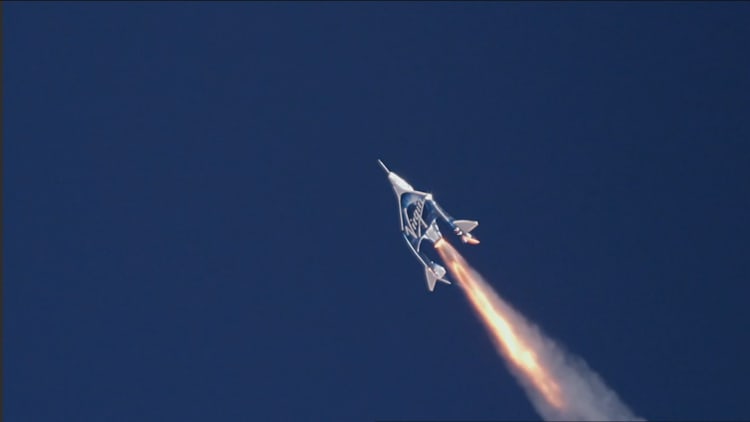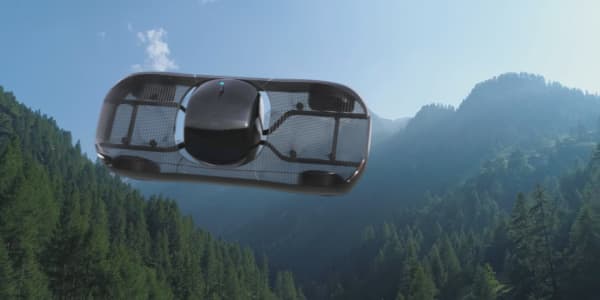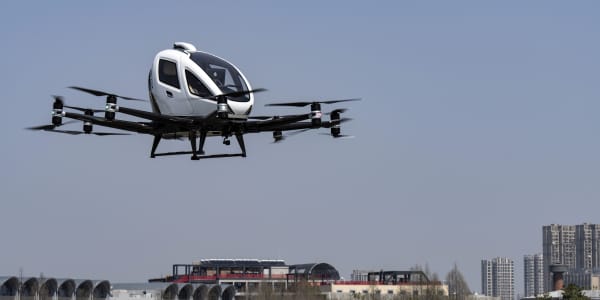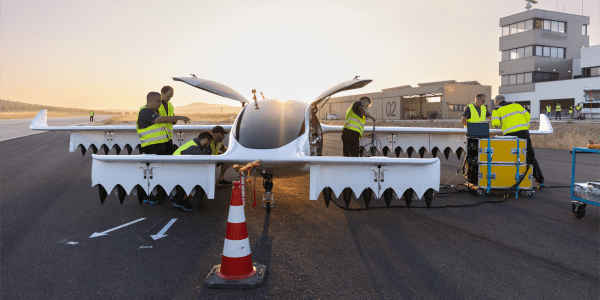Virgin Galactic reached nearly halfway to space in the second powered flight of its Unity spacecraft Tuesday, putting the company only months away from launching its first commercial passengers.
"It will be something like two or three more flights before we're actually in space," founder Richard Branson told CNBC after the second test flight, which he called "a tremendous step in the right direction toward accomplishing our goals."
Branson's space company has "a step-by-step cautious approach" in its testing program, he said, doing "whatever it takes to make absolutely certain that we've put everything to bed" before trying to send humans into space. Tuesday's flight was its second rocket-powered launch since the fatal crash of its Enterprise spacecraft on Oct. 31, 2014. Unity underwent extensive engine testing and seven glide tests before Virgin Galactic said it was ready to make another rocket-powered flight.

Once Virgin Galactic has "a safe craft" that can reach more than 264,000 feet, Branson said, he will go up.
"Soon after that, we'll start taking some of our astronauts up," Branson said.
A key part of Virgin Galactic's plan to turn space tourism into a business is rapid reuse of the spacecraft. Unity was lifted into the air by the jet-powered mothership Eve, taking off from the Mojave Air and Space Port in California. It was released from under Eve's wing about an hour later, when Unity's rocket engine roared to life, sending the spacecraft at about twice the speed of sound to 114,500 feet. Unity then returned, using a technique called feathering to re-enter the atmosphere and glide back down to a landing on the same runway it had left.
This technique of reaching space means Virgin Galactic was able to turn Unity around only 54 days after its first launch. Coincidentally, that's the same amount of time it took NASA to launch, land and launch again the space shuttle Atlantis in 1985 — the fastest turnaround during the shuttle program.
"Ultimately we'll be able to cut it down to every four days," Branson said. He added that the goal of four days will only be realized "well after the test program is completed."
For now, Branson is focused on his company creating a reliable means of letting more people experience weightlessness. In the latest test flight, Unity's rocket engine fired for 31 seconds. Virgin Galactic will likely aim to fire the engine for 40 seconds on the next flight, according to Branson, and 50 seconds on the following flight.
"And then, if that's all gone according to plan, 63 seconds will be what will take us into space," Branson said.
Competing with Jeff Bezos and Blue Origin
Branson is neck and neck with fellow billionaire Jeff Bezos as their companies close in on launching tourists into space. Branson said he does "not see this as a race," despite the comparison often arising.
"Both companies need to succeed," Branson said. "If one beats the other by a couple of months, one way or the other, as far as the long term is concerned, that's not important."
Bezos has been pouring nearly $1 billion a year from his Amazon holdings into Blue Origin, the rocket-builder he founded in the pursuit of reaching zero-gravity conditions. Blue Origin is in the final stages of testing its New Shepard rocket, most recently launching its human-carrying capsule to 322,405 feet in an eighth successful flight on April 29. Blue Origin CEO Bob Smith told CNBC on April 18 that he hopes his company will be launching tourists to space on New Shepard this year.
'No ride anywhere in the world that will be like it'
Branson said Tuesday he could imagine the pilots' reaction as he watched the spaceship blast skyward "straight up in front of us."
"When you are talking about going from naught to 3,500 mph in 8 seconds straight up — there will be no ride anywhere in the world that will be like it," Branson said.
He said he believes his first spaceflight "will be the most important day of my life" and he hopes it will be the beginning of meaningful experiences for many others.
"That hopefully will open up space for hundreds of thousands of people in the years to come," Branson said.
Branson compared today's private space companies with the fledgling commercial air industry in the 1920s, much like SpaceX founder Elon Musk did earlier this month.
While Virgin Galactic has more than 700 would-be astronauts signed on to launch, tickets are priced at $250,000 per flight. When commercial air travel was developing, Branson said, "it cost a [relatively] similar sum of money to send wealthy people across the Atlantic [Ocean]. ... And over the years the price came down to a level where enormous quantities of people were able to go."
Virgin Galactic is also "trying to get to a level where we are completely environmentally neutral," Branson said. He explained that he does not want Virgin Galactic to be contributing more harm to the Earth than it gives back, even as it helps unlock new discoveries for humanity.
"Therefore people can go to space without damaging the environment and really enjoy the wonderful overview that has meant so much to the people who have already been to space," Branson said.






